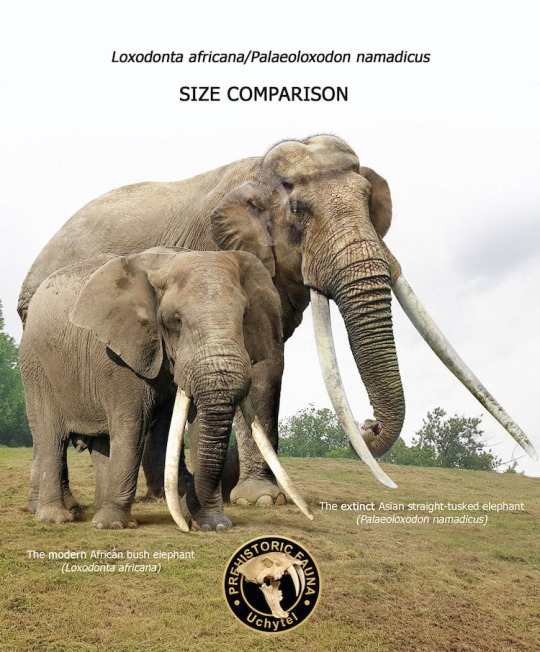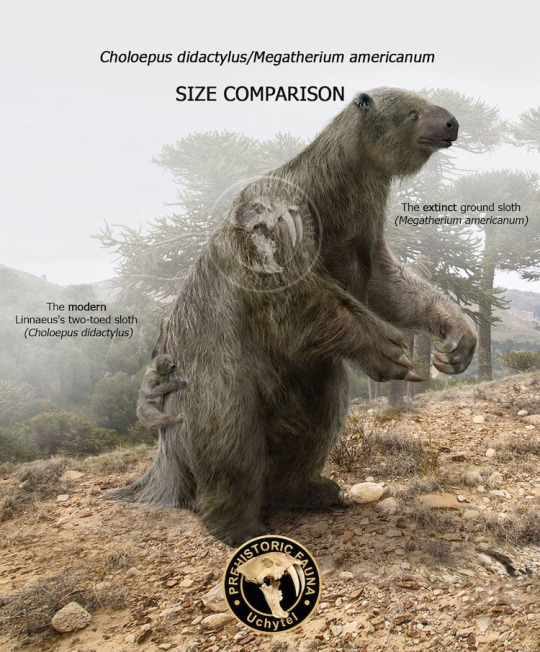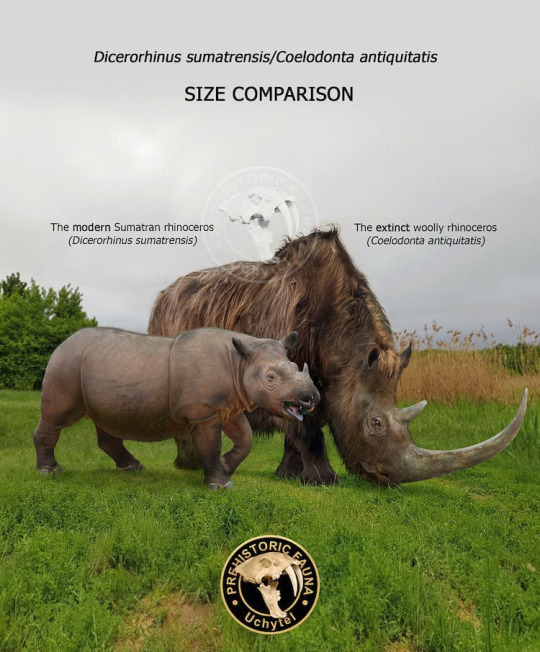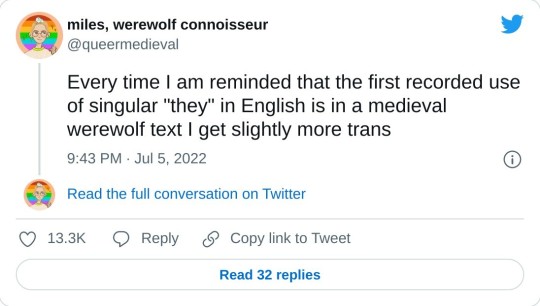A blog where I can wax poetic about stationery, literature, academia, and other stuff. I also make printable bookmarks and other digital stuff on etsy.
Don't wanna be here? Send us removal request.
Text
Illustrations Show Size Difference Between Prehistoric Animals and Modern Descendants












92K notes
·
View notes
Text


the english language is truly a wonder
79K notes
·
View notes
Text

We needed to know this.
512 notes
·
View notes
Text
Today I learned that the word "milquetoast" (someone who is timid, submissive, a pushover, etc.) is from Caspar Milquetoast, a character from a comic by HT Webster in the 1920s. The title of the series was The Timid Soul.
0 notes
Text
Lucid Lily 25
Day 25 - Latin.
I found myself interested in Latin but the only stuff I knew were things taught in college so I decided to explore more.
Here are 3 amazing links for more phrases you should definitely get to know!
23 phrases list.
50 phrases list.
200+ latin phrases list.
Do explore these and have fun Learning!
115 notes
·
View notes
Text
Latin resource reviews
Part I: Lingua Latina per se Illustrata
Ok, so, I'm definitely biased here, and I won't even try to hide that. I've learnt most of my Latin with this book and it has never let me down. It's simply amazing. It's well written, has an active and helpful community, and its original per se illustrata approach is a lifesaver for autodidacts
Full review under the cut
Pros:
Well-written plot that explores ancient Roman culture and daily life, with characters from all walks of life
New grammar and vocab are introduced naturally through context and a consistent system of marginal notes
Very effective at teaching - Familia Romana alone goes from elementary to upper intermediate levels
Easy to access in a digital form
Active community providing support and additional content
Cons:
Some chapters introduce too much new grammar and vocabulary, which might be a bit of a roadblock at times
The grammar parts only being in Latin can make it harder for someone unfamiliar with the general concepts to understand
The physical books are hella expensive
Final verdict: 5/5
Tips:
Read everything in order: the main chapter first, then the corresponding colloquium in Colloquia Personārum. This makes the story make way more sense
Print out chapters you struggle with and highlight all the difficult parts. Review them more and do the associated exercitia
Use the playlist linked below to review. It will help your pronunciation and listening comprehension while still allowing you to actually read the text. You should still use the book itself at first though, as the grammar and exercises parts are both pretty important to go over
Review all chapters regularly. The ideal approach is to re-read each chapter until you understand them perfectly, but just reviewing stuff regularly is good enough
Links:
All the books (PDF)
The playlist
96 notes
·
View notes
Text
Inspiring latin phrases:
Dum Spiro, Spero : while I breathe, I hope.
Carpe Diem : seize the day.
Carpe Noctem : seize the night.
Alis Propriis Volat : she flies with her own wings
Acta, Non Verba : actions, not words.
Discendo Discimus : by touching we learn.
Barba Tenus Sapientes : wise as far as his beard.
Brutum Fulmen : senseless threat.
Felix Culpa : happy fault.
Ex Nihilo Nihil Fit : from nothing comes nothing.
Audere est Facere : to do is to dare.
Semper Fidelis : Always faithful.
Amor Omnia Vincit : Love conquers all.
Bona Fide : with good faith.
4K notes
·
View notes
Text
Cases
Case, from casus (lat.: a falling, as in ‘a noun falling away from its original form’): The change of a noun to show its relationship to other words in a sentence.
A declension of a noun is a list of all its potential cases. To decline a noun is to go through all its cases.

Nominative: when the noun is the subject of a sentence
Vocative: when the noun is the person being directly addressed
Accusative: when the noun is the direct object of a sentence
Genitive: when the noun shows possession; of [noun]
Dative: when the noun is the indirect object of a sentence; to, for [noun]
Ablative: when the noun marks the preposition of a sentence; by, with, from, on, in [noun]

78 notes
·
View notes
Text
In the Renaissance a new middle class emerged who wanted their children to speak the dialect of the “upper” classes. This desire led to the publication of many prescriptive grammars. In 1762 Bishop Robert Lowth wrote A Short Introduction to English Grammar with Critical Notes. Lowth prescribed a number of new rules for English, many of them influenced by his personal taste. Before the publication of his grammar, practically everyone—upper -class, middle-class, and lower-class—said I don’t have none and You was wrong about that. Lowth, however, decided that “two negatives make a positive” and therefore one should say I don’t have any; and that even when you is singular it should be followed by the plural were. Many of these prescriptive rules were based on Latin grammar and made little sense for English. Because Lowth was influential and because the rising new class wanted to speak “properly” many of these new rules were legislated into English grammar, at least for the prestige dialect—that variety of the language spoken by people in positions of power.
—Victoria Fromkin et al., An Introduction to Language, 10th edition
85 notes
·
View notes
Text
Fossil Words
Interesting linguistics and language tidbit: fossil words are words that are mostly obsolete, except for their use in a specific phrase or idiom. Examples from English include:
ado: as in without further ado (and also the title of Shakespeare’s Much Ado About Nothing), meaning “trouble or fuss”.
bandy: as in bandy about, meaning “to give and receive reciprocally” or “to pass around casually” it could also mean “to fight with or against someone” (’the prince expressly hath forbidden bandying in the Verona streets’, Shakespeare).
bated: as in with bated breath not to be confused with its homophone baited. Bated means “reduced or lowered.” It comes from abate which is still used in law.
beck: as in at one’s beck and call, a beck is a nod of the head or motion of the hand used as a call or command. It has the same root as beckon (as in ‘he beckoned her from across the room’).
eke: as in eke out a living, meaning “to increase or augment”. There’s a remnant of this word in nickname which came from the compound ekename, which literally means “additional name”.
fettle: as in in fine fettle, meaning either a physical state or a mental state. This is similar to another fossil word, kilter, as in out of kilter, where kilter means “good condition”.
fro: as in to and fro, coming from the Scottish pronunciation of the word. Another more obsolete form of the idiom is ‘fro and till’ if you wanna show off to your friends or something.
kith: as in kith and kin. Kith referred to friends and acquaintances. Kin referred to family and relatives. An archaic version of this was kith and kine meaning “relatives and property”, or literally, “friends and cattle”. So, if you like your cows but not your family, maybe use the older version!
shebang: as in the whole shebang. This originally meant “temporary shelter”. It somehow came to mean “any matter of present concern”. May also be seen spelled chebang.
shod: as in roughshod. Shod means “wearing shoes” though I think it may now mean “having tires”. This has nothing to do with the word shoddy which is instead from shoad meaning “loose stone and rubble” (maybe?).
wend: as in wend your way, meaning “to pursue or proceed”. The modern past tense of wend is wended, but originally its past tense was went. That’s right. Went. Similar to send/sent, lend/lent, spend/spent, we had wend/went. For some reason it was decided to use went as the past tense of the word go instead (the original past tense of go was yede, so really I don’t blame them).
wreak: as in wreak havoc, meaning “to inflict or cause something, especially harm, or to take vengeance” (’on me let Death wreak all his rage’, Milton). Its often mistakenly written as “wreck havoc”. Might not be around much longer!
yore: as in times of yore. The word yore means “time long past” and comes from the same root as the word year.
1K notes
·
View notes
Text
Just so damn good!
youtube
Still remembering this Super Bowl performance, and I don't even watch Super Bowl.
1 note
·
View note
Text

Fanart of Shen Wei Clothing Collection in Guardian. asdfghjkl so cute 😍
credit: on pic
520 notes
·
View notes
Text
My school just played Imagination, the first opening song from Haikyuu! and honestly I could not stop myself from singing along.
Good thing there wasn't anyone around that time.
Sometimes this job can get really tiring, but then things like this happen, and they remind me why I applied in the first place.
Of course anime is a huge reason I joined the program. It was part of my childhood, and it was a gateway to being curious enough to learn more about Japan's culture and history.
And sometimes it just tickles me like crazy when I hear anime songs being played in a drug store, school, or department store.
1 note
·
View note
Text
Back-Formation
Another strange linguistics thing that I adore, back-formation is the forming of a new word by removing affixes (usually not actual affixes but parts of the root presumed to be an affix) from another word.
Some Interesting Examples Include…….
The verb enthuse from the noun enthusiasm, which was used as early as 1827 but STILL angers people? That’s just how language works, y’all, if you gon’ be mad about enthuse you can’t use the rest of these words. That’s just how it fuckin’ be.
Singular pea from Middle English plural pease, which was originally singular and collective (like with “wheat” or “corn”).
The word mix was originally in Middle English myxte which sounded like a past participle, even though it wasn’t.
Chemist comes from alchemist, where the “al-” prefix is actually the Arabic definite article “the”. Full etymology is something like greek khuma, fluid, to khumeia, art of alloying metals, to Arabic al-kimiya, to early Latin alchimista, to Medieval Latin (al)chimista, to French chimiste, to Early Modern English chymist to our chemist of today. Of course, we still have the word alchemist but it means finding the ultimate panacea and eternal youth and making gold from, like, iron or something. I fucking love historical linguistics.
The verb escalate from the noun escalator, which was a brand name made from the word escalade plus the suffix “-tor” as in “elevator” (originally the stress was supposed to be on CAL in es-CAL-a-tor, but you don’t always get what you want) and the word escalator was trademarked but rip you really don’t always get what you want. Oh, and then eventually escalate replaced escalade entirely, so, there’s that. (Another side note, the word wasn’t commonly used until its more metaphorical meaning came into play during the cold war)
Other Back-Formations Include…….
donate from donation
edit from editor
televise from television
babysit from babysitter
laze from lazy
grovel from groveling
surreal from surrealism
back-formate from back-formation (how fucking meta is that, eh?)
3K notes
·
View notes
Text
Shibboleth
New word I learned today. It refers to any custom or tradition (usually linguistic in nature) that distinguishes groups of people; think secret passwords or the specific way a linguistic group pronounces something that "gives them away."
For example, "gay lingo" as it's called in the Philippines. If I were traveling around and I heard someone say Haggardo Versosa, I would immediately peg that person as Filipino because that is gay lingo, and only a Filipino would know what that term means. It's a play on a Filipino actor's name plus being haggard or tired btw.
So, according to Wikipedia, shibboleth can also mean jargon in a broader sense and can even be extended beyond linguistic distinctions. For example, it can be fashion, diet, and cultural values.
Although the concept isn't new to me -- and to most people on the internet and off it -- it strikes me differently now that I have a term for it. Jargon expresses something different, so having this term "shibboleth" gives this idea / concept a different kind of nuance, like what other shibboleths can I find throughout history, how have they been used by groups in power to segregate people and further their racist agenda?
What popular shibboleths are used today? Used in wars? Are there similar shibboleths used in different countries? How did they become shibboleths?
This reminds me of that time that the term "the Asian squat" became popular on Youtube. A couple of Youtubers (I'm not sure who it was off the top of my head) talked about it to some people, Asian and non-Asians, and some of them confirmed that they've heard of the Asian squat as being a "thing."
But down on the youtube comments, predictably, there were people from other countries saying it's "this-and-that squat" referencing other countries, other ethnic groups.
I wasn't exactly surprised by that. There are billions of people around the world. Obviously, the ability to squat...perfectly? Without losing balance? Quickly? Gracefully?... isn't something only Asians can do.
But those comments just made me think of what I now know is called shibboleth.
God, language is so vastly interesting.
Edit: I just read about furtive shibboleths.
DAMNIT THIS IS SO INTERESTING.
2 notes
·
View notes
Text
Language, Culture, Translation and Native Speaker Definition Confusion
I had some idealistic and hopeful fantasies a week ago about being a translator. Then I read something about this native speaker principle.
Of course, that pissed me off and got me mad because I'm a non-native English teacher and the "native speaker" issue is still lurking around.
But then I calmed down and thought, well, there's a reason for the principle (when it comes to translation). Translating is not just about using the nearest or most accurate word in the target language. It balances foreignization and domestication, of knowing when to keep the foreign flavor and spirit and when to use local environs and atmosphere.
And someone who has grown up in the culture of the target language will surely know the nuances behind the slang, colloquial terms, etc.
But here's the problem. Culture isn't just the "large culture." There's also the "small culture." For examples, different states have their own collouqial terms. Even social classes will have different cultures. Also, the translator will have to be well-versed in a specific field, like medicine, law, etc.
You might be a native speaker of the target language but you don't know the jargon and terminology of a specific field in the target language.
My fantasies of being a translator stemmed from my desire to learn multiple languages (Korean, Japanese, Mandarin Chinese, Thai, Spanish, Arabic?).
My main reason for learning them is largely personal: I watch shows and listen to music in these languages (except for Spanish and Arabic; the former because many Filipino words already stem from Spain anyway and I find it the easiest to learn and the latter because there are many Muslim people in the Philippines and wouldn't it be nice to communicate with each other in that language too? (Wait, now I'm not sure if it's actually Arabic or Maranao. Damnit, I need to research.)
Anyway, all these thoughts tripping over each other in my head finally led me to a longheld regret - that I never became fluent in my own native language simply because although I use it in my daily life, I don't use it for school or work.
And that's the thing, isn't it? My first language is Cebuano/Bisaya but I'm not proficient in it when it comes to using it in a formal way. For example, masses, religious ceremonies, and meetings in the local communities are often done in Bisaya but the Bisaya used here is too "deep" and sometimes difficult for me to understand.
I don't feel like a fluent native in my own first language. English, on the other hand, I acquired fr school, watching TV, and reading books. I'm more proficient in this language than I am in my first language.
I can write a thesis paper in English and understand novels written in English. I can't do the same in Bisaya. I'm not used to reading novels in actual Bisaya.
Yet, I am not considered a native speaker. I feel confused, lost, and frustrated with myself.
Even the elders and my parents make snide remarks about me and my generation not knowing some deep Bisaya words. And I usually answer with, "Well, how the heck is that my fault?" I didn't enroll myself in schools that used English as a medium of instruction.
I'm thankful for it, yes, but I'm not gonna take the blame for not being good at Cebuano because my parents only used conversational Bisaya at home anyway. How the heck was I gonna learn? If I wanted to do well in school, I had to be good in English because most of the subjects were in English!
But I don't regret it. Because of English, I learned to love reading, both fiction, and non-fiction. And I began to understand the need to learn other languages.
And I also learned that I need to teach myself more words in Cebuano. I need to be well-versed in deep Bisaya. No one else is gonna teach me so I have to teach myself.
I know the Bisaya language, but I'm not used to reading reports and book-length write-ups written in Bisaya. That's the thing I need to train myself to do.
Because I know that other Bisaya people in my generation also struggle with "deep" Bisaya. I'm afraid that, one day, the deepness and richness of our language will be lost and only the simple conversational lexicon will remain.
And this realization and renewed desire birthed another fantasy: Well, maybe I should translate public domain short stories to Bisaya for radio listeners? For NGOs handling young kids? For the elders and others not so well-verses in English and Filipino?
I don't know if that'll really happen in the future, but I learned never to shut the door on possibilities. One never knows what doors will open in the future.
9 notes
·
View notes
